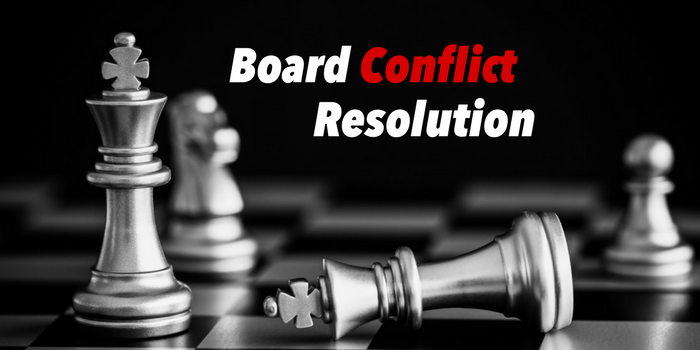As a member of your HOA’s Board of Directors, you’re accustomed to listening to homeowners’ concerns, disputes, and complaints and resolving these issues to the best of your abilities. But what happens when your fellow Board members have an argument? What should you do if a dispute between board members gets in the way of making important decisions on time or completing important tasks?
This week, we are going over tips to help your board avoid internal conflict and resolve the disputes that do occur as quickly and easily as possible.
Avoiding Conflict
- Focus on clear, objective, accurate communication. Many conflicts result from unclear instructions or responses to questions. Work to write in a clear, objective style that identifies the day, time, and place of events, spells participants’ names correctly, and uses accurate data. People can become frustrated from late information as well. If a board member is unable to attend a meeting, for instance, be sure to send them the meeting minutes as soon as possible. Additionally, allow each board member’s opinion to be heard and acknowledged—do not discount another’s ideas, even if you disagree with them.
- Split work fairly. Every volunteer on your board of directors has made a unique commitment to serve your community. To ensure that no one is overburdened with more responsibilities than they committed themselves to complete, weigh each task according to length, difficulty, and expertise before assigning it to a director. You might even enlist an un-involved third party, such as your community manager, to help you split up the work fairly. This way, no one is accidentally overworked.
- Look for problems and be solution-minded when you find them. One of the best ways to avoid conflict is not to blame other board members for problems that arise. Instead, find the cause of the problem and make a team plan to solve it. Remember to separate the person from the problem—don’t shoot the messenger! To help you separate people from problems, work to understand everyone’s plausible solutions and their concerns about the issue. Then, work for a compromise that best addresses everyone’s needs and desires. If you show that you have the other directors’ backs when trouble arises, they are more likely to have yours if you need help!
- Know how to give and receive criticism. No one likes to be corrected, but learning from our mistakes is the best way to improve. The mark of a great leader is someone who is not afraid of facing their faults! When given criticism, focus on learning why you made the mistake, and then, either ask or look for a solution to prevent the same mistake from happening again. When giving criticism, your words should always be constructive. Effective criticism does not sound or feel like criticism at all; it consists of “building up” words, not “cutting down” ones.
- Show proper appreciation for every board member. Acknowledge each board member’s contribution to the team’s efforts. Don’t praise one director for the excellent community newsletter, but then forget to thank another for the wonderful pool party they planned and oversaw. If everyone on your board feels like a valuable, contributing member, no one will complain or argue that the board of directors is unfair or that some peoples’ views are taken more seriously than others’.
- Keep homeowners in mind. Remember that the purpose of an HOA’s Board of Directors is to create a pleasant community for its members. Put the needs of the community before your own suggestions or opinions. If you cannot agree on a solution to an issue, seek professional advice from Spectrum and request input from your homeowners.
Resolving Conflict
- Stay calm, respectful, and polite. If you are confronted by an angry or upset board member, it is very important to separate yourself from the problem and stay objective. This mindset will allow you to find the source of the issue, so it can be dismantled. Your polite gravity will also help calm the upset board member, which will make discussing the issue easier.
- Ask questions to find the underlying cause of the conflict, so you can solve it. First, listen to everything the other board member (or members) has to say and sympathize with their problem. Next, repeat the main points of the problem to make sure you have understood. After you have completed these steps, you will be able to ask for the appropriate information to resolve the conflict, which might include the priority of results, next steps, deadlines, resources, etc. Lastly, you can suggest solutions and work with the other directors to solve the problem.
- Recognize manipulation and know how to respond. What do you do if another board member doesn’t want to help fix the problem, but instead wants to shift blame or responsibility onto someone else? If another board member continuously makes excuses or devalues the importance of essential tasks, stand firm on these requirements and simply reiterate that the task must be completed. Agree that the task is difficult, or tiresome, or tedious, but firmly state that it still must be done.
- Use a third, un-involved party to mediate, if necessary. As in dividing tasks, if an internal board conflict becomes too much for you to handle on your own, call in a third party to listen to each person’s side of the issue and come up with a compromise. Your Community Manager can always lend a hand!
Running your Houston association is much easier when all board members work together and support one another for the greater good of the neighborhood. By following these tips, you can build a supportive, helpful atmosphere that will cause you to look forward to board meetings and foster pride in the community you are creating.







